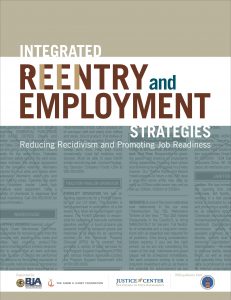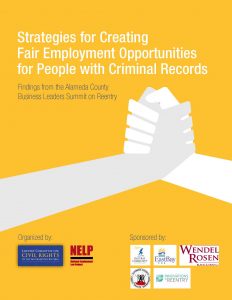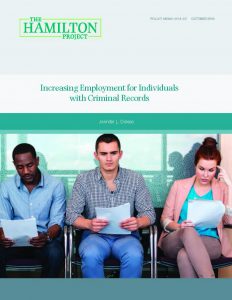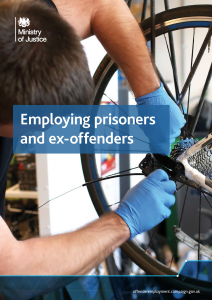The following is a collection resources from organisations based in the US, UK and Australia designed to assist and guide employers in developing fair employment opportunities for people with criminal records.
The Power of Work
Publication Date: 2006 Country: US
States and localities across the United States are feeling the aftereffects of a 25-year incarceration binge. In a period of just 15 years, from 1980 to 1995, the number of people incarcerated in federal and state prisons and local jails more than tripled, from about 500,000 to more than 1.5 million. Today, more than 2 million people are behind bars nationwide. Since almost all prisoners are eventually released, an incarceration boom necessarily translates into a reentry boom. In fact, more than 600,000 people are released from prison each year. Unfortunately, most end up back in the criminal justice system before long. With state and local budgets strained by the high cost of incarceration, breaking the cycle of recidivism is one promising way to shrink the prison population — as well as to increase public safety and to improve the well-being of former prisoners, their families, and their communities.
On the Record: Guidelines for the prevention of discrimination in employment on the basis of criminal record
Publication Date: 2012 Country: Australia
Over recent years, the Commission has received a significant number of complaints from people alleging discrimination in employment on the basis of criminal record. The complaints indicate that there is a great deal of misunderstanding by employers and people with criminal records about discrimination on the basis of criminal record. ‘On the Record’ provides information and practical guidance on how to prevent criminal record discrimination in the workplace. It covers existing anti-discrimination and related laws, as well as best practice principles when recruiting or employing someone who may have a criminal record.
Integrated Reentry and Employment Strategies
Publication Date: 2013 Country: US
The Integrated Reentry and Employment Strategies white paper was written to address the challenges that service providers cannot successfully serve every adult on probation or leaving prison or jail who needs a job. There are simply not enough resources and attempting to serve everyone would be largely ineffective. Also, some individuals require intensive services and programming, while others perform better with lighter interventions and supervision.
The white paper can help policymakers, system administrators, and practitioners collaboratively determine whether resources are focused on the right people, with the right interventions, at the right time.
Recruiting safely and fairly guide: A practical guide to employing ex-offenders
Publication Date: 2015 Country: UK
This publication has been produced by Nacro’s Employer Advice Service with the support of
the Chartered Institute of Personnel and Development (CIPD) and the Disclosure and Barring
Service (DBS) and is primarily set within the context of the legal arrangements in England
and Wales. It is a practical guide aimed at employers and recruiters of paid or voluntary
staff to help them to understand their legal rights and responsibilities and good practice
when employing staff with criminal records. The guidance outlines how to implement fair,
safe and responsible policies and practices for employing ex-offenders, based upon a full
understanding and assessment of risks involved.
Recruiting safely and fairly guide: A practical guide to employing ex-offenders
Publication Date: 2015 Country: US
Alameda County business leaders, employers, entrepreneurs, staffing agencies, workforce development professionals, and government agencies and officials recently gathered for the Business Leaders Summit on Reentry: Strategizing for a Strong Local Economy. The three-event series, held on June 18th, June 24th, and July 17th, drew 90 participants, all of whom brought tremendous energy and interest in developing strategies to work together to increase employment opportunities for Alameda County residents with a prior criminal record.
Hiring Ex-offenders: A Toolkit for Businesses
Publication Date: 2016 Country: UK
Virgin Trains has today launched a toolkit for businesses which offers practical advice on hiring ex-offenders. The train company, which is part-owned by Richard Branson, is calling for more businesses to follow their example and employ people with previous convictions. In the past 3 years, Virgin Trains on the west coast has hired 30 ex-offenders of which 25 still work for the company in roles across the business. Employment has shown to significantly decrease the risk of recidivism. Not a single ex-offender employee or candidate in the talent pool at Virgin Trains has re-offended and the company is looking to hire more.
Increasing Employment for Individuals with Criminal Records
Publication Date: 2016 Country: US
Workers with criminal records, in particular black and Hispanic males with criminal records, face many labor market challenges-over and above the challenges faced by the larger population of low-skilled workers. Finding ways to improve employment outcomes for individuals with criminal records is an urgent priority with implications for public safety, the economy, and families of those with records. New evidence documenting unintended negative consequences of one recent attempt to address this concern—Ban the Box laws that delay employer access to information about applicants—should be considered as the policy discussion moves forward. As policymakers continue efforts to address employment among workers with criminal records, it is imperative that they begin with an understanding of how employers interact with job applicants who have criminal records. Accordingly, a multi-pronged approach—inclusive of effective policies aimed at building workers’ skills, communicating their work-readiness to employers, and promoting robust labor markets for low-skilled workers—is necessary for improving employment outcomes for workers with criminal records.
Employing prisoners and ex-offenders
Publication Date: 2018 Country: UK
Over half of employers struggle to fill vacancies due to skills shortages, according to The Chartered Institute of Personnel and Development (CIPD).
Working with prisons to offer training and employment opportunities makes good business sense, as well as helping prisoners and ex-offenders get their lives back on track. It allows your business to unlock opportunity and tap into a new pool of talented, highly motivated people who you might not have considered before.
There are a range of ways to get involved with prisoners and ex-offenders, which have different business benefits. This guide will help you to identify the best option for your organisation and find out more from other businesses, already reaping the rewards of working with prisons or employing ex-offenders.







